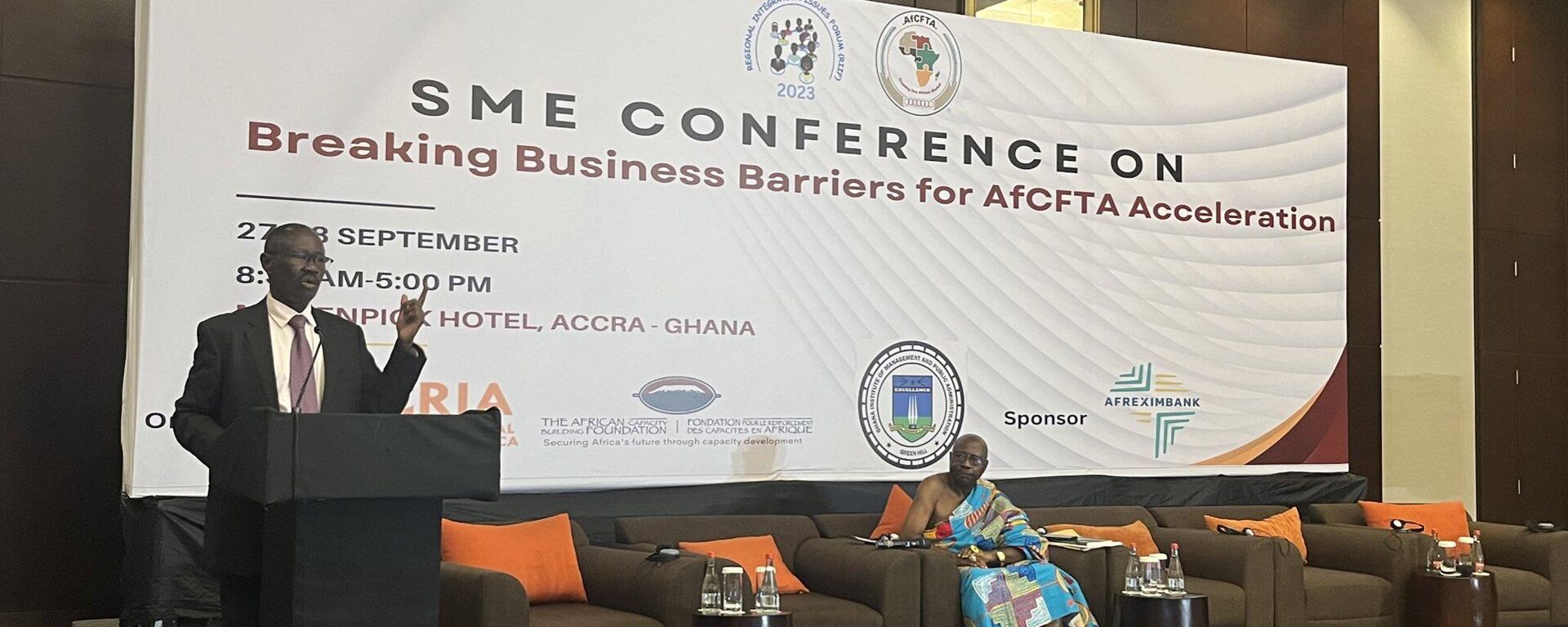https://en.sputniknews.africa/20231007/africa-needs-industrial-infrastructure-development-energy-security-to-be-world-powerhouse-experts-1062605693.html
Africa Needs Industry, Infrastructure Development, Energy Security to Be World Powerhouse: Experts
Africa Needs Industry, Infrastructure Development, Energy Security to Be World Powerhouse: Experts
Sputnik Africa
On Wednesday, Director-General of the World Trade Organization Ngozi Okonjo-Iweala said that the African economy could compete with China and India in the... 07.10.2023, Sputnik Africa
2023-10-07T17:12+0200
2023-10-07T17:12+0200
2023-10-08T12:42+0200
china
india
sputnik africa
economy
opinion
africa insight
egypt
ethiopia
kenya
brics
https://cdn1.img.sputniknews.africa/img/07e7/06/1d/1060236320_0:27:1280:747_1920x0_80_0_0_5adf245b57a2856adc9eb1b063d72305.jpg
Africa needs industrialization, energy security and infrastructure development to become a world economic powerhouse, Tafadzwa Ruzive, PhD in development finance from South Africa's Nelson Mandela University and an international finance expert told Sputnik Africa.Speaking about consequences of the continent's dependence on the US dollar, Ruzive noted that not only does the use of US currency in intra-African trade increase the cost of trading due to transactions charges, but it also reduces the trade volume as "people pull out of making trade," when the US dollar is too expensive.In addition, the analyst highlighted that the US dollar is used as a "weapon" by the United States because when the currency is "extra strong," it cheapens goods and African states earn very little for raw materials.Therefore, Ruzive believes that trading on local currencies could become "the viable alternative" for the US dollar, praising BRICS ambition to start utilization of national currencies. Commenting on the US dollar overreliance and the impact of it on Africa, Mary Lucia Mbithi, a senior lecturer at School of Economics in the Kenyan University of Nairobi, highlighted that apart from increasing the cost of doing business and preventing African states from trading with each other, dependence on the US currency provokes inflation in domestic markets.Moreover, the expert emphasized that the US dollar overreliance triggers increase in prices of fuel, which affects, in turn, such sectors of the economy as industrial processes, transportation and employment.Furthermore, according to the researcher, following the impact on transportation and employment, high inflation rates in the domestic market influences the supply of goods and services, commodity prices, income, GDP of the country and generally hinders the economic development of the state.As for the solution to the problem, Mbithi is convinced that a common currency for the African states "is the ideal thing," however, she noted that implementing this "would take a long time."What Remains to be Done to Fully Implement AfCFTA Agreement?The head of the WTO also emphasized the unprecedented opportunities for economic integration offered by the African Continental Free Trade area.Speaking about the initiative, Mbithi underscored the opportunities that it unveils for the continent, for its growth, "for increased trade among themselves, and also increased trade for both goods and services, and which is critical for employment."However, the researcher emphasized that "a lot remains to be done by the African countries" for the development of AfCFTA, including trade facilitation, which presumes eliminating of non tariff-barriers such as visas, that complicate the movement of people.In addition, the expert noted that it is necessary to work on other issues such as cross border requirements, which include "standards and rules of origin, where the product has come from and the proof that product has originated from African countries, as well as issues related to ensuring that the standards have been met, the standards of one country and another one."Mbithi also suggested several options for trade facilitation, including "recognition or agreeing on one rules of origin" by the states of the continent and "harmonization of the standards within the region so that the standards are easily acceptable."Apart from this, the expert highlighted that it is crucial for African countries to improve the transport infrastructure in order to develop intra-continental trade.As for the other analyst's opinion on the matter, Ruzive emphasized that it is essential to create a new "financial paradigm" in order to implement the AfCFTA, which means to move away from the US dollar and trade in local currencies.Continuing the topic, the researcher stressed that "a proper financial architecture at the African level," which will facilitate trade in domestic currencies, is required.Furthermore, Ruzive noted that the initiative is starting to operate, citing as an example that Kenya sent tea to the Comoros.How Will Inclusion of Ethiopia and Egypt in BRICS Help Boost African Economic Growth?On the BRICS Summit in late August in South Africa, the applications of six states to join the bloc were approved. The countries will become full participants of the organization in January. Among the future BRICS members, there are two African countries, namely Ethiopia and Egypt.Commenting on the advantaged of BRICS expansion for the continent, the South African analyst highlighted that Ethiopia and Egypt "become the key growth drivers on the African continent."He added that judging from the forecasts of their GDP growth, the two states were a "continental powerhouse in terms of" development, they are "looking very good" because these countries are using their domestic resources to the fullest.Ruzive also underlined that "Ethiopia and Egypt could be the growth leaders, the highest growing economies" in Africa for the next decade.Elaborating on this topic, the Kenyan researcher emphasized that the benefits that Ethiopia and Egypt are going to obtain from BRICS will be transferred to other countries of the continent as they participate in the AfCFTA and in the Common Market for Eastern and Southern Africa (COMESA).In addition, according to her, the inflow of goods from BRICS countries to the two African states and subsequently to the rest of the continent will, on one hand, help Africa to learn, but, on the other hand, will "create competitiveness for the weak industries in the African countries."
https://en.sputniknews.africa/20231005/us-dollar-dominance-ensures-free-flow-of-wealth-from-global-south-to-west-expert-says-1062563750.html
https://en.sputniknews.africa/20231006/intra-african-trade-to-generate-over-70-billion-for-continent-afcfta-says-1062591179.html
china
india
egypt
ethiopia
kenya
Sputnik Africa
feedback@sputniknews.com
+74956456601
MIA „Rossiya Segodnya“
2023
Rasina Musallimova
https://cdn1.img.sputniknews.africa/img/07e7/0a/17/1063019139_0:0:646:646_100x100_80_0_0_348c74b69cf86748a53875f8148a2f85.jpg
Rasina Musallimova
https://cdn1.img.sputniknews.africa/img/07e7/0a/17/1063019139_0:0:646:646_100x100_80_0_0_348c74b69cf86748a53875f8148a2f85.jpg
News
en_EN
Sputnik Africa
feedback@sputniknews.com
+74956456601
MIA „Rossiya Segodnya“
Sputnik Africa
feedback@sputniknews.com
+74956456601
MIA „Rossiya Segodnya“
Rasina Musallimova
https://cdn1.img.sputniknews.africa/img/07e7/0a/17/1063019139_0:0:646:646_100x100_80_0_0_348c74b69cf86748a53875f8148a2f85.jpg
china, india, sputnik africa, economy, africa insight, egypt, ethiopia, kenya, brics, common market for eastern and southern africa (comesa)
china, india, sputnik africa, economy, africa insight, egypt, ethiopia, kenya, brics, common market for eastern and southern africa (comesa)
Africa needs industrialization, energy security and infrastructure development to become a world economic powerhouse, Tafadzwa Ruzive, PhD in development finance from South Africa's Nelson Mandela University and an international finance expert told Sputnik Africa.
"Industrialization, energy security and infrastructure development, I could say, are the three pillars that are needed to make a pathway to making Africa an international economic powerhouse along the lines of India and China," the expert said.
Speaking about consequences of the continent's
dependence on the US dollar, Ruzive noted that not only does the use of US currency in intra-African trade increase the cost of trading due to transactions charges, but it also reduces the trade volume as "people pull out of making trade," when the US dollar is too expensive.
"Trading in the US dollar takes a huge chunk out of growth due to transaction charges, as well as more importantly, quantitative restrictions that are imposed on the dollar by the Fed in America. For instance, at the moment, the US dollar index is trading at above 106, which means dollar liquidity globally is tight. And you can imagine the negative impacts that this dollar shortage has on intra-African trade. So not only are transactions charges the problem; when dollar liquidity is tight like this, intra-African trade actually goes back because when the dollar is that expensive, the prices for importers become very high and people pull out of making trade. So there is a massive reduction in the volume of intra-African trade when dollars are scarce," he explained.
In addition, the analyst highlighted that the US dollar is used as a "weapon" by the United States because when the currency is "extra strong," it cheapens goods and African states earn very little for raw materials.
"So when the dollar is extra strong like it is now, it negatively affects African growth because the prices of commodities become very, very cheap and African countries get very little for the raw materials. If you are talking in geopolitical parlance, this is the concept of the weaponization of the dollar, that there are times when America, through the Fed, makes the dollar so strong that it makes all the commodities around the world cheap, getting itself ahead at the expense of commodity producers," the researcher revealed.
Therefore, Ruzive believes that trading on local currencies could become "the viable alternative" for the
US dollar, praising BRICS ambition to start utilization of national currencies.
"As a result, there's definitely a need for alternatives. And a key alternative that is to be developed is stimulating trade in local currencies. An initiative that I am happy that BRICS is pursuing when the BRICS first five [member countries] are opening up trade in local currencies. If Africa can make its financial system strong and begin to trade in domestic currency internationally among themselves, that is the viable alternative against the hedging of the US dollar," the expert stressed.
Commenting on the US dollar overreliance and the impact of it on Africa, Mary Lucia Mbithi, a senior lecturer at School of Economics in the Kenyan University of Nairobi, highlighted that apart from increasing the cost of doing business and preventing African states from trading with each other, dependence on the US currency provokes inflation in domestic markets.
"The main impact of depending on the dollar for trading in Africa, including intra-continental trading, is it raises the cost of doing business. And we know that in many countries there's a shortage of dollar. And this means this will impact on how those countries will be able to trade among themselves, even among the African countries. Another very key and important thing is that depending on the dollar, when we know that many African countries are importing many goods such as fuel and also importing foods really leads to inflation in the domestic market," Mbithi underlined.
Moreover, the expert emphasized that the US dollar overreliance triggers increase in prices of fuel, which affects, in turn, such sectors of the economy as industrial processes, transportation and employment.
"When imports of fuel, and we know that there's global inflation, we know that the cost of fuel, for instance, or foods when imported and people have to convert the prices into the local currency, then we know that that price goes up and that will translate to higher prices in the domestic market. Products such as fuel, for example, are critical in all the sectors of the economy. They will impact on processing, they will impact on industrial processes, they will impact on transportation, and all those are going to impact on employment," the analyst explained.
Furthermore, according to the researcher, following the impact on transportation and employment, high inflation rates in the domestic market influences the supply of goods and services, commodity prices, income, GDP of the country and generally hinders the
economic development of the state.
"They are going to impact on the supply of goods and services. They are going to impact on prices. And eventually this will translate to impacting on income, GDP, production of the country and therefore on the whole economy and therefore leading to slow growth of the economy, be it through goods exports and imports, as well as domestic production for export markets," she added.
As for the solution to the problem, Mbithi is convinced that a common currency for the African states "is the ideal thing," however, she noted that implementing this "would take a long time."
"Although this is a long term process and which I consider is the ideal thing for African countries is to work through a common currency, because if they work through a common currency, I know this would take long, but it is very critical because it will mean that the region can be able to trade much more easily among itself, and this will quicken the process of trading, when also it will lower the cost of trading because they don't have to convert the local currencies to the dollar," the Kenyan expert stressed.
What Remains to be Done to Fully Implement AfCFTA Agreement?
The
head of the WTO also emphasized the unprecedented opportunities for economic integration offered by the African Continental Free Trade area.
Speaking about the initiative, Mbithi underscored the opportunities that it unveils for the continent, for its growth, "for increased trade among themselves, and also increased trade for both goods and services, and which is critical for employment."
However, the researcher emphasized that "a lot remains to be done by the African countries" for the development of AfCFTA, including trade facilitation, which presumes eliminating of non tariff-barriers such as
visas, that complicate the movement of people.
"There are a lot of non-tariff barriers. You know, the African Continental Free Trade Area proposes free trade. So the issue of tariffs comes down, but we have many other non-tariff barriers that remain. For example, if you talk about the issue of movement of persons. For example, to do business or to supply services, you realize that the issue of trade facilitation, the issue of visas becomes a challenge because in many countries in Africa, you realize that when members of African countries will require a visa to be able to visit another country, this limits issues, for example, trade in services, including tourism, including where there is natural movement of persons to supply services such as consultancies, such as training and medical and other services that require movement of people," the analyst said.
In addition, the expert noted that it is necessary to work on other issues such as cross border requirements, which include "standards and rules of origin, where the product has come from and the proof that product has originated from African countries, as well as issues related to ensuring that the standards have been met, the standards of one country and another one."
Mbithi also suggested several options for trade facilitation, including "recognition or agreeing on one rules of origin" by the states of the continent and "harmonization of the standards within the region so that the standards are easily acceptable."
"So harmonization is one thing, or they can agree on recognition of the standards such that the standards that have been recognized in one country that have been provided, if one country has an institution that provides the standards mark, then other countries within the region will be able to recognize that standards mark and will be able to accept the products as having met the sanitary and phytosanitary requirements of the agricultural products or any other standards of goods," she added.
Apart from this, the expert highlighted that it is crucial for African countries to improve the transport infrastructure in order to develop
intra-continental trade."There are several infrastructures that are critical for African countries to be able to trade better among themselves, the first one being transport infrastructure, including both the roads transport, as well as the rail transport, as well as the air transport, which remain a challenge in African countries," the researcher underlined.
As for the other analyst's opinion on the matter, Ruzive emphasized that it is essential to create a new "financial paradigm" in order to implement the AfCFTA, which means to move away from the US dollar and trade in local currencies.
"The AfCFTA agreement, in my view, cannot be fully implemented on the back of trade in the US dollar. The key thing to implementing the AfCFTA is to develop a counterpart financial paradigm. So if we are opening all our countries, we also need to develop robust local currencies to trade under the AfCFTA, because if we open up the countries and we are still trading in the US dollar, there's a risk that the US dollar will be manipulated to make commodity prices even cheaper. So they key thing is to set up our financial systems to trade in local currencies amongst ourselves as Africans," he elaborated.
Moreover, the South African expert underscored that using national currencies in trade is "the ingredient that is going to put a rocket under the progress of the AfCFTA."
Continuing the topic, the researcher stressed that "a proper financial architecture at the African level," which will facilitate trade in domestic currencies, is required.
"It seems there will not be too many problems in opening the borders, fixing the customs and letting the goods through. But where I see an issue, there is a need for a proper financial architecture at the African level that can guide national financial systems to be able to robusticize [sic] trade in domestic currencies to drive forward. Once we have the AfCFTA, the rules and the value chains image plus this financial arm, that is the key ingredients to making the AfCFTA a success," he said.
Furthermore, Ruzive noted that the initiative is starting to operate, citing as an example that Kenya sent tea to the Comoros.
"The AfCFTA [agreement] has been ratified, the instruments have been deposited. We are seeing action at the borders. We are hearing about the guided trade initiative where countries [are] actually beginning to import. There is a company from Kenya that recently sent tea to Cameroon and the people in Cameroon were shocked. And also out of those things they were shocked by was that it was actually finished tea that can come from Kenya, there are exciting things that are happening there on the ground," the expert stressed.
How Will Inclusion of Ethiopia and Egypt in BRICS Help Boost African Economic Growth?
On the BRICS Summit in late August in South Africa, the applications of six states to join the bloc were approved. The countries will become full participants of the organization in January. Among the future BRICS members, there are two African countries, namely Ethiopia and Egypt.
Commenting on the advantaged of
BRICS expansion for the continent, the South African analyst highlighted that Ethiopia and Egypt "become the key growth drivers on the African continent."
He added that judging from the forecasts of their GDP growth, the two states were a "continental powerhouse in terms of" development, they are "looking very good" because these countries are using their domestic resources to the fullest.
"Why are they looking good? It's because their domestic financial markets are deepening. They are preparing to trade in domestic currencies. They are fully utilizing their domestic resources through financing as much of their investments using their local currencies. So we've seen massive improvements in Egypt. We've seen massive improvements in Ethiopia," the expert explained.
Ruzive also underlined that "Ethiopia and Egypt could be the growth leaders, the highest growing economies" in Africa for the next decade.
"I foresee the way they are standing with the development of their financial markets, Ethiopia and Egypt could be the growth leaders, the highest growing economies, in fact, would say, the growth leaders of the African continent for the next 10 to 15 years. So it is an exciting time to be in Ethiopia, it is an exciting time to be in Egypt. They are doing the necessary reforms both on the trade side and the financial side to position themselves as a trade powerhouse," he mentioned.
Elaborating on this topic, the Kenyan researcher emphasized that the benefits that Ethiopia and Egypt are going to obtain from BRICS will be
transferred to other countries of the continent as they participate in the AfCFTA and in the Common Market for Eastern and Southern Africa (COMESA).
"The benefits that these countries get from BRICS are likely to flow to the other African countries through the learning process because these countries are part and parcel of the African countries and also belong to the other groupings in African countries, including COMESA and of course the African Continental Free Trade Area. So a lot of learning, which means benefits to the other African countries," Mbithi revealed.
In addition, according to her, the inflow of goods from BRICS countries to the two African states and subsequently to the rest of the continent will, on one hand, help Africa to learn, but, on the other hand, will "create competitiveness for the weak industries in the
African countries."
"Increased competition, again, as I've said, has the two sides, there is the one side of learning which is good for the countries to learn and adapt to their production, which is positive. But on the other hand, it will create competitiveness for the weak industries in the African countries. And this may present a challenge for their growth because we know that the countries are not yet at a point where they can compete equally with the BRICS member countries," the analyst said.




